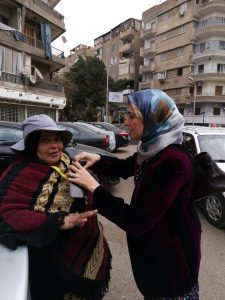Professor Shereen Hussein in Cairo
In most high-income countries, the changing demographics and the shift in population structures are well observed. Considerable research is conducted to ensure all people, and especially those at older ages, continue to live their life to the full and contribute to the wider society. Despite this, there are considerable inequalities in the experiences of different groups of older people, their health, ability to participate and access to and quality of care when needed. On the other hand, many of Low and Middle Income Countries (LMICs) are in the beginning of appreciating the impact of similar changes. In most LMICs, the challenges and opportunities of fulfilling the aspirations, as well as meeting the health and care needs, of older people are usually over shadowed by other pressing policy priorities such as elevating poverty and reducing youth unemployment.
The MENA region is observing fast paced changes with some countries completely transitioning from ageing to aged populations within as little as 20 years compared to around 100 years observed earlier in Europe. With historical high fertility rates, this is not only happening fast but happening for large cohorts of people. Within such changes, women are significantly impacted both as older people and as provider of care and support. In MENA region, caring for older people is considered a private, family, matter with most caring responsibilities shouldered by younger women in the family; whether daughters or daughters-in-law. Women providing unpaid care, are also expected to meet the needs of other family members such as children, those who are ill or disabled, in addition to expectations of formal or informal labour participation and domestic duties. On the other side of the coin, due to differential life expectancy across gender and historical large inter-spousal age gaps, high proportions of older women tend to live alone or with their offspring with little external engagement opportunities. Within these dynamics ensuring the wellbeing and health of older people and those caring for them, particularly women, is paramount.
In 2020, I was able to secure a GCRF partnership grant that allowed me to consolidate and grow the network of prominent researchers, advocates and international organisations who are keen on developing response to ageing populations in the region. I was able to engage in constructive dialogues with various stakeholders and give voice to the views of older people and informal cares through engagement events and informal video interviews. This work has resulted on establishing the MENARAH network (Middle East and North Africa Research on Ageing), which aims to ensure impact by ensuring a strong platform for knowledge mobilisation and capacity to undertake further research that is specific to the priority area of healthy ageing in the region.
Engagement event in Cairo

